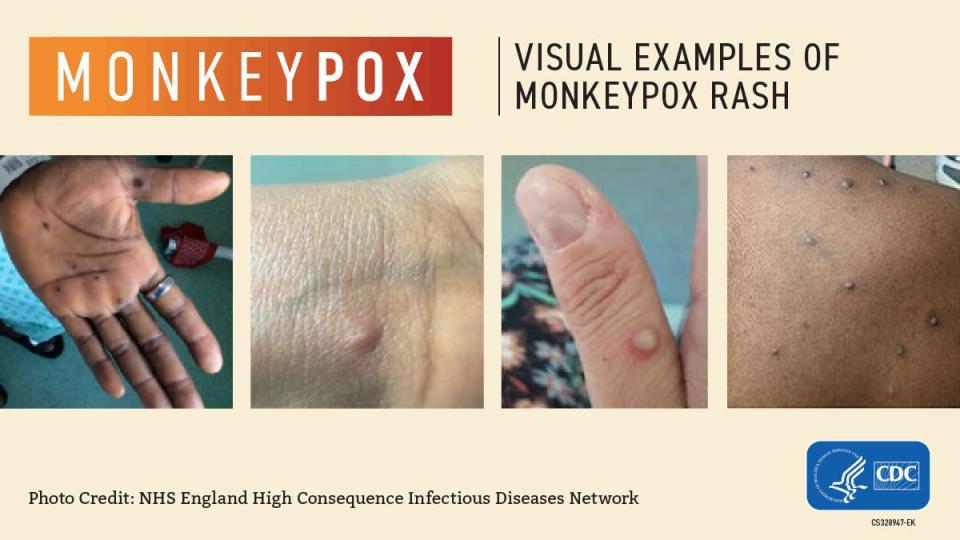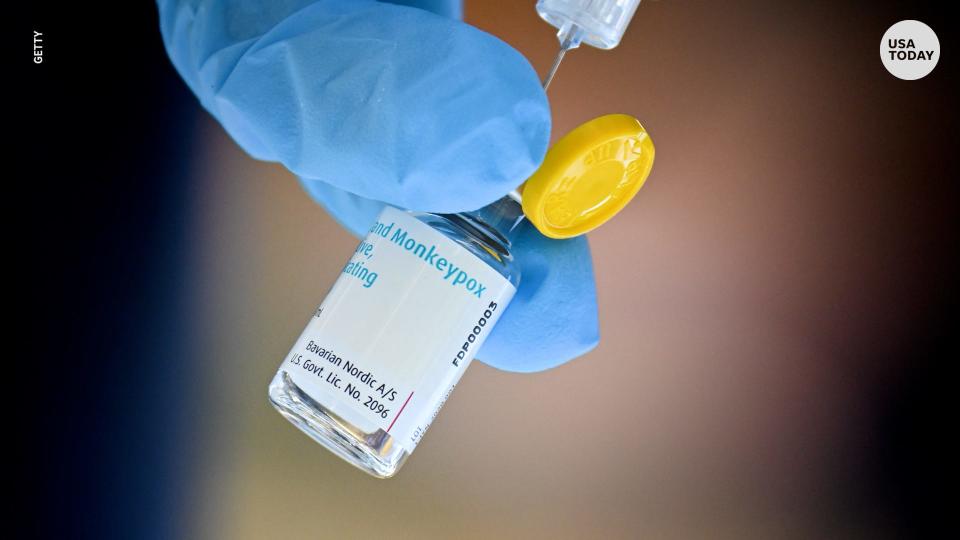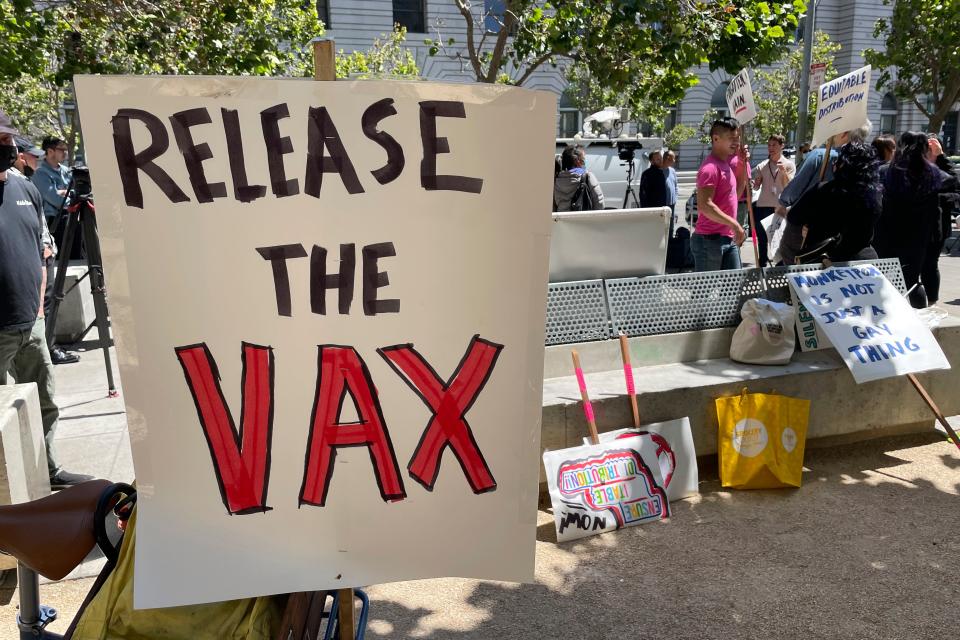Palm Springs man shares monkeypox experience: 'This could have been so much worse'
Palm Springs resident Kyle Wilkins didn't think much, or really even care, about monkeypox when he heard it was spreading around the world. Even though his side hustle is engaging in sex work with male clients — a population that has been at high-risk for infection during the current outbreak — he still didn't think it would affect him.
But the 36-year-old got a little nudge from a friend to get his first dose of the Jynneos vaccine, which was approved in 2019 by the Food and Drug Administration for the prevention of smallpox and monkeypox in people ages 18 and older. In addition to possibly preventing monkeypox, a virus that is spread through close contact with skin lesions or bodily fluids or clothing or linens from an infected individual, the vaccine may also lessen symptoms in people who have been exposed.
Vaccines have been scarce throughout the nation and in the Coachella Valley, and certain groups of people are being prioritized for shots, including those with a known monkeypox exposure, people who engage in transactional sex or survival sex, and men who have sex with men who have had a bacterial sexually transmitted infection in the last three months.
Even though he qualified for the vaccine, Wilkins thought, "are there so many more people out there who need it more than I do?"
Two days later, he was thankful he received his first shot when he noticed three sores on his genitals.
At first, he thought it was a side effect of the vaccine, but most people who get the Jynneos vaccine experience mild symptoms, such as pain, redness, swelling, firmness or itching at the injection site, a low-grade fever, swollen lymph nodes, tiredness or headache.
Related: New delivery of monkeypox vaccine could expand availability, prioritization in Riverside County
More: Riverside County Public Health declares public health emergency as monkeypox cases grow

Eisenhower Health's chief medical officer, Dr. Alan Williamson, said the Jynneos vaccine is a live virus vaccine, but it's a nonreplicating version of the virus, meaning it can't reproduce and produce disease. It will cause the immune system to react, but most of the generalized symptoms "are a reflection of our immune system's response more than the action of the underlying virus." Side effects from the vaccine would come on typically 12 to 24 hours after injection and last for about 24 to 48 hours.
Getting a rash elsewhere on the body following vaccination may be an indication that someone already had a mild case of the virus and the vaccine may or may not have made it less severe, Williamson said.
Soon after, Wilkins' whole body was in pain, he had an off-and-on fever, diarrhea for a few days and a swollen lymph node in his groin area.
"I felt absolutely miserable," he said. He also had a painful ear infection, likely caused by a hint of swimmer's ear he had a week prior to vaccination. Common monkeypox symptoms include fever, headache, muscle aches, swollen lymph nodes, rash and lesions often in the genital and perianal region.
Wilkins said he has sensitive skin and occasionally develops eczema. The area on his genitals was already "kind of raw and irritated," and later "erupted" in sores and became inflamed and swollen after a few days. He has not noticed rashes or sores on any other body parts.
See also: Interested in a monkeypox vaccine? Riverside County Public Health wants to hear from you
More: 'This vaccine should be here right now': Residents frustrated over low monkeypox vaccine supply
People with monkeypox often get a rash that may be located on or near the genitals or anus and could be on other areas like the hands, feet, chest, face or mouth, according to the Centers for Disease Control and Prevention. The rash will go through several stages, including scabs, before healing. Those with a history of eczema or certain other skin conditions may also be at high risk of severe disease from monkeypox.
But the vaccine "definitely took the edge off," said Wilkins.
Williamson explained that if the monkeypox vaccine is given within four days of exposure to the virus, there is a good chance it can prevent disease from occurring. If it is given up to 14 days after exposure, it could reduce the severity of the illness. After 14 days, "it's less clear what kind of effect it will have." He added that people who received a smallpox vaccination when they were younger might experience a less severe monkeypox infection as well.
Wilkins said he does not know who exposed him to monkeypox. No one has come forward to say they developed monkeypox, and he's even spoken with a few individuals himself, but no leads have turned up.
Among the most difficult parts of his illness has been the ear infection, he said. Following his vaccination, he noticed liquid discharge from his ears and swelling. A few days later, he woke up in the middle of the night in pain and went to the emergency room at Desert Regional Medical Center. Ear drops and antibiotics have eased the pain since then.
"The last time I was ever sicker was with giardia like three years ago," Wilkins said. "The good news is after a few days, I'm recovering. Besides the sores themselves, I actually feel pretty fine. I feel pretty great. My energy's up."

While Williamson hasn't seen or read about a scenario involving simultaneous ear and monkeypox infections, it's not uncommon for patients to have multiple concurrent infections. During the current outbreak, there have been instances of people with a sexually transmitted infection, such as gonorrhea and syphilis, and monkeypox, and even COVID-19 and monkeypox.
Wilkins has asked if there are any treatment options available to help with his symptoms. His health care provider initially told him there was nothing available, Wilkins said, but when he later asked about Tecovirimat (TPOXX), the provider said it is very hard to get and is being saved for "urgent cases."
Riverside County Public Health states most patients have not required TPOXX, and symptoms have resolved on their own with symptom management strategies. TPOXX is a medication approved by the FDA for smallpox but not monkeypox. The CDC has tentatively recommended its use to treat severe symptoms in immunocompromised patients.
Wilkins has been isolating and staying away from others until he makes a full recovery. He added that his employer is also aware of his situation.
Read more: Palm Springs mayor calls on CDC, CDPH to shift strategies with monkeypox vaccines
Though he's thankful he received a vaccine — "this could have been so much worse for me" without it, he acknowledged — like many of his fellow community members, Wilkins is frustrated that it's difficult for others to get their turn. Local health care providers have primarily distributed doses among their highest-risk patients due to limited supplies. Because of that, many have traveled to neighboring Los Angeles County, which has received its own allocation of vaccines from the federal government, to attend vaccination clinics and even made up stories to get a shot, residents have said.

"That was what disturbed me most, telling me over and over again to lie to someone, to lie to a public official, to lie to someone who could administer this vaccine and give an excuse to get it," Wilkins said. "Immediately I'm like, why do I have to do that? Why does anyone have to beg? Why does anyone have to lie to get this if they want it? Isn't this supposed to be a public service for the sake of public health?"
Riverside County health officials are hopeful that a new vaccine delivery method could bring broader vaccination events and expand prioritization groups locally.
People who have recovered from a monkeypox infection are advised to use condoms for 12 weeks when engaging in sexual activity until more is known about potential infectivity in semen during the period that follows recovery, the World Health Organization advises.
There is also limited data available on whether a previous monkeypox illness gives someone immunity against future infections and, if it does, for how long. The World Health Organization suggests people do everything they can to avoid re-infection.
Editor's note: A previous version of this story contained incorrect information about a possible way monkeypox can spread.
Ema Sasic covers entertainment and health in the Coachella Valley. Reach her at ema.sasic@desertsun.com or on Twitter @ema_sasic.
This article originally appeared on Palm Springs Desert Sun: Monkeypox symptoms show after California man gets vaccine

